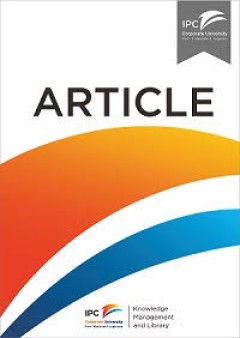Ditapis dengan

Total quality management (TQM)-an overview
- Edisi
- Vol. 17 Issue: 1, pp.15-19
- ISBN/ISSN
- -
- Deskripsi Fisik
- -
- Judul Seri
- The Bottom Line: Managing Library Finances
- No. Panggil
- ATC MG TAL t
- Edisi
- Vol. 17 Issue: 1, pp.15-19
- ISBN/ISSN
- -
- Deskripsi Fisik
- -
- Judul Seri
- The Bottom Line: Managing Library Finances
- No. Panggil
- ATC MG TAL t

RESEARCH AND CONCEPTS Components of successful total quality management
According to the literature, quality management consists of a set of components: critical factors, tools, techniques and practices. The purpose of this paper is: to identify the components of total quality management (TQM), in order to make them known to managers and thus facilitate successful quality management implementation, and to show the situation of 106 ISO 9000 certified firms concernin…
- Edisi
- Vol. 17 No. 2, 2005 pp. 182-194
- ISBN/ISSN
- 0954-478X
- Deskripsi Fisik
- 13P
- Judul Seri
- RESEARCH AND CONCEPTS
- No. Panggil
- ATC MG TAR c

New research : a new forecasting model for the diffusion of ISO 9000 standard…
ISO 9000 standards for quality system management are involving a higher and higher number of enterprises and organizations. This paper presents a detailed analysis of certification diffusion in Italy and in some European countries with similar economic structures. Benchmarking and evolution forecasts are based on the “logistic model”, traditionally used for studying biological growth phenom…
- Edisi
- Vol. 21 No. 1, 2004 pp. 32-50
- ISBN/ISSN
- 0265-671X
- Deskripsi Fisik
- 23 P.
- Judul Seri
- International Journal of Quality & Reliability Management
- No. Panggil
- ATC LO FRA n

Optimization of documentation systems in the electronics industry of Hong Kong
Many people believe that good documentation systems are vital for quality performance of a company. However, if the system is not optimized or it does not take the specific industry into consideration, inefficiency may result. Therefore, in the process of implementing the ISO 9000 standards, careful matching between the standard requirements with the practical characteristic of the industry i…
- Edisi
- Vol. 11 Issue: 6, pp.355-358
- ISBN/ISSN
- -
- Deskripsi Fisik
- 5 p.
- Judul Seri
- Logistics Information Management
- No. Panggil
- ATC LO WON o

ISO and ABC: complements or competitors?
ISO 9000 and Activity‐Based Costing (ABC) are two useful tools for logisticians. Both of these tools can support efforts to improve customer service and/or reduce total costs. Using survey and case study methods, we investigate whether these two techniques are implemented together as complements, are kept separate, or are considered competitors for scarce resources (money, time and talent). T…
- Edisi
- Vol. 13 Issue: 2, pp.91-100
- ISBN/ISSN
- -
- Deskripsi Fisik
- 12 p.
- Judul Seri
- The International Journal of Logistics Management
- No. Panggil
- ATC LO KER i

ISO 9001 model support for software process assessment
For most software companies, the pressure for process improvement arises from the direction of a recently released standard in the domain of process assessment and determination of capability (ISO 15504). In the case of ISO 9001 a valuable framework for evaluation of the degree of compliance to this standard is provided by SABS ARP 042: 1997, while ISO 15504 Part 5 offers a detailed assessmen…
- Edisi
- -
- ISBN/ISSN
- -
- Deskripsi Fisik
- 7 p.
- Judul Seri
- Logistics Information Management
- No. Panggil
- ATC LO WAL i

ISO 9001 diffusion analysis according to activity sectors
The purpose of this paper is to analyse the evolution of the world-wide diffusion, according to industrial sectors of activity, of the ISO 9000 family of quality standards.
- Edisi
- Vol. 111 No. 2, 2011 pp. 298-316
- ISBN/ISSN
- -
- Deskripsi Fisik
- 22 p.
- Judul Seri
- Industrial Management & Data Systems
- No. Panggil
- ATC LO BER i

Are ISO 9000 and TQM routes for logistics excellence?
The value of ISO 9000 and TQM are revisited, including the relationship with logistics strategy and the four pillars of TQM. The Japanese TQM experience is put under close scrutiny, which leads to the need for TQM model. A model called TQMEX standing for a TQM EXcellence Model has been developed based on sound TQM practices. Further to a previous survey conducted on 180 UK firms, another questi…
- Edisi
- Volume 10 · Number 6 · 1997 · 275–283
- ISBN/ISSN
- -
- Deskripsi Fisik
- 11 p.
- Judul Seri
- Logistics Information Management
- No. Panggil
- ATC LO SAM a
 Karya Umum
Karya Umum  Filsafat
Filsafat  Agama
Agama  Ilmu-ilmu Sosial
Ilmu-ilmu Sosial  Bahasa
Bahasa  Ilmu-ilmu Murni
Ilmu-ilmu Murni  Ilmu-ilmu Terapan
Ilmu-ilmu Terapan  Kesenian, Hiburan, dan Olahraga
Kesenian, Hiburan, dan Olahraga  Kesusastraan
Kesusastraan  Geografi dan Sejarah
Geografi dan Sejarah